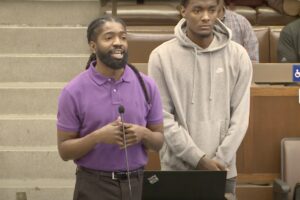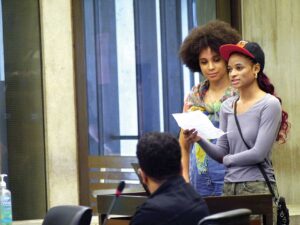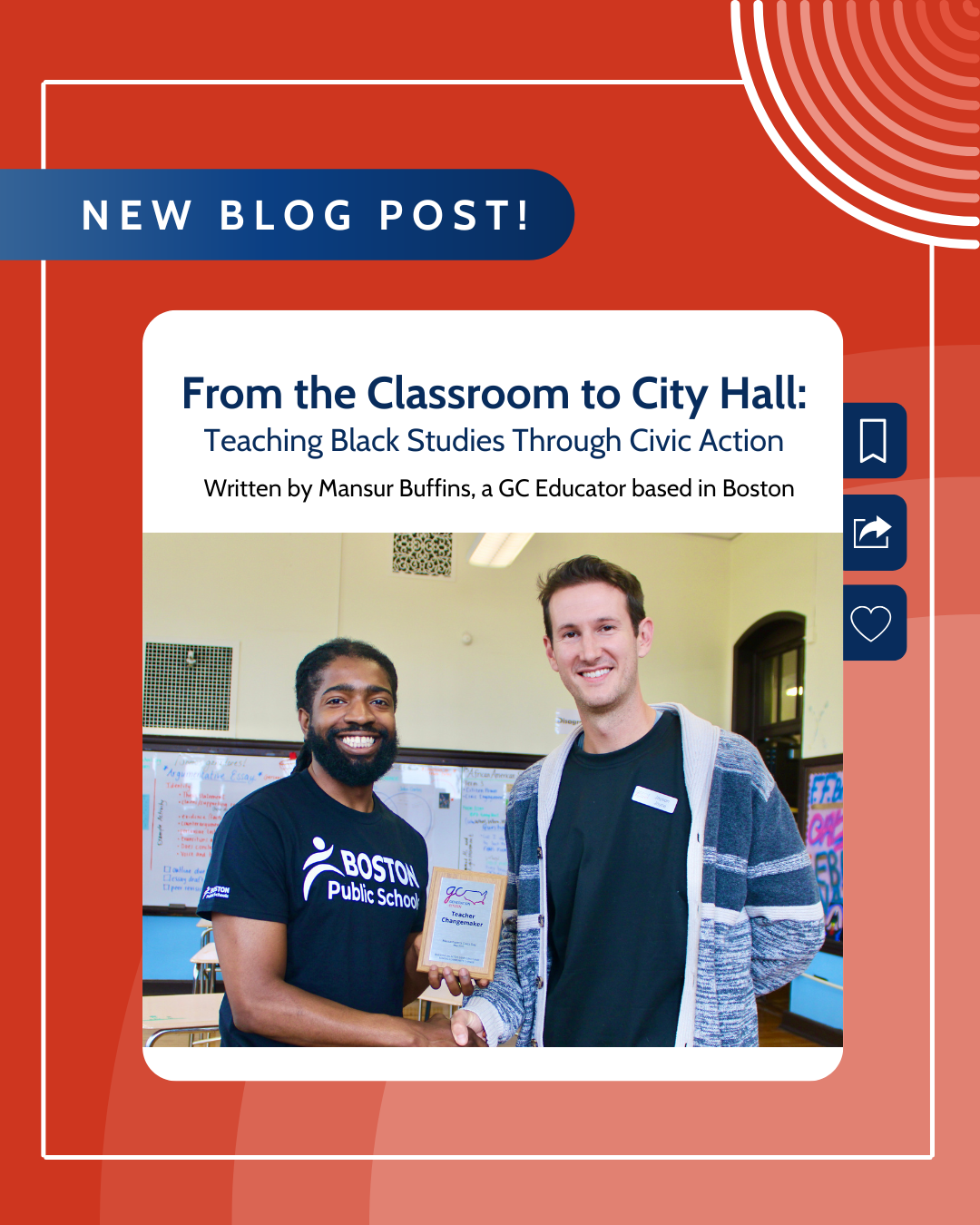Written by Mansur Buffins, a GC Educator based in Boston, Massachusetts
When I entered the teaching profession as a social studies teacher in Atlanta, GA, I had my eyes set on teaching Black Studies. Now, nearly a decade later, I finally had the opportunity to do so.
I am Mansur Buffins, a Black man who teaches a class of Black students at a public alternative high school in Boston, Massachusetts.
Teaching Black Studies extends beyond historical facts; it’s about empowering my students to shape their present and future — a commitment to uplifting their voices and nurturing their civic courage. My planning for the year took an incredible turn when my principal, who is also deeply committed to student civic engagement, encouraged me to attend Generation Citizen’s professional development and embed civic engagement into my course. Her vision aligned with mine, and I prepared to move my student learning beyond the textbooks and into the community through meaningful civic engagement. Partnering with Generation Citizen wasn’t just helpful; it amplified my ability to guide my students in understanding power, agency, and their role in the long Black Freedom Struggle.
What unfolded this year was nothing short of astounding. I stand in awe of my students — prophets of their own liberation. Through deep discussions about the community issues that weighed heaviest on them, they reached a powerful consensus: their civic project would focus on the Boston Police Department’s Gang Unit. Their voices were filled with justified concern, rage, and contempt, sharing the Unit’s negative impact on their lives and neighborhoods. While not every student had a direct, personal encounter, many carried the weight of its reality.
Interwoven with our Black Studies curriculum, my students embraced Generation Citizen’s Advocacy Hourglass framework. As a class, we dove into rigorous research and root cause analysis, including a trip to the Boston Public Library to explore research databases. They then identified clear goals and stakeholders, especially after Boston Mayor Michelle Wu announced a $1.7 million grant to the Boston Police Department to combat gang violence. The centerpiece of their action plan was to speak at the City Council Committee on Public Safety and Criminal Justice hearing, proposing their solutions to gang violence and advocating for a reallocation of grant funds away from the police budget. Without surprise, their goals centered fiercely on supporting and protecting youth in their communities.
One moment crystallized the significance of our work: “I want to be an activist.” A student from another class popped into my room and noticed the letter from Mayor Wu that we were annotating. When I explained that my class was preparing speeches for City Hall, his face lit up! He shared his desire to testify and declared his activist ambitions. I said, “Join us!”
Within a couple of weeks, he, alongside my students, collaborated and crafted compelling speeches, urging the Committee to allocate the grant funding towards community-based solutions – solutions envisioned by youth, for youth.
Pushing through varying degrees of trepidation, my students delivered powerful speeches at City Hall. Their voices echoed even further, landing in The Bay State Banner, a newspaper they had used during the earlier research phase of their project. Their names, their words, and their courage are now part of the public record.
The pride radiating from my students as they read the article, seeing their names and their truths reflected in it, was palpable. They weren’t just proud of their grades; they were proud of standing tall and speaking truth to power in the legacy of those they had been learning about throughout the year. They eagerly took those pages home to their families. And beyond pride, there was something even more powerful: hope. Hope that their actions, courage, and voices would spark the change they want to see – the change they deserve to see.
This was more than a class project. It is proof of what happens when Black student voices are centered and equipped with tools for civic action. We must believe in their power to challenge systems that criminalize their existence. We must empower them to resist. Their journey from the classroom to City Hall is a testament to the transformative power of education rooted in justice and the unstoppable force of youth demanding a better world. Their civic courage has inspired my own.
Let’s keep listening. Let’s keep amplifying. Let’s keep believing in them.
I am thankful to have received the Teacher Changemaker Award from Generation Citizen. I want to give a huge shoutout to my Generation Citizen Coach Jayson Joyce, whose support was invaluable throughout this journey in facilitating this project for my outstanding students.
Always more work ahead.
Mansur Buffins and Kai (student) testifying at City Hall on June 5, 2025 (courtesy: Boston City Council)


Adama (student) testifying at City Hall on June 5, 2025 (photo credit: Yawu Miller)
